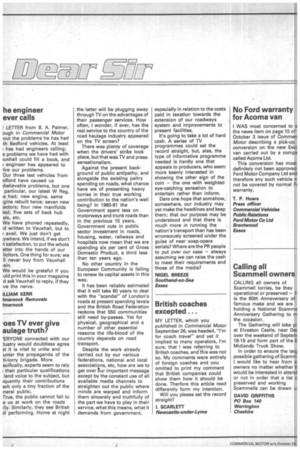, oes TV ever give aulage truth?
Page 18

If you've noticed an error in this article please click here to report it so we can fix it.
rERYONE connected with our lustry would doubtless agree st it is vital to unite and unter the propaganda of the ti-lorry brigade. More ecifically, experts seem to rely 'their particular qualifications lend voice to the subject, but !quently their contributions ach only a tiny fraction of the 'floral public.
True, the public cannot fail to e us at work on the roads lily. Similarly, they see British il performing. Home at night
the latter will be plugging away through TV on the advantages of their passenger services. How often, I wonder, if ever, has the real service to the country of the road haulage industry appeared on the TV screen?
There was plenty of coverage when the drivers' strike took place, but that was TV and press. sensationalism.
Against the present background of public antipathy, and alongside the existing paltry spending on roads, what chance have we of presenting heavy lorries in their true working contribution to the nation's well being? In 1980-81 the Government spent less on motorways and trunk roads than in the previous 15 years. Government cuts in public sector investment in roads, housing, water, railways and hospitals now mean that we are spending six per cent of Gross Domestic Product, a third less than ten years ago.
No other country in the European Community is failing to renew its capital assets in this way.
It has been reliably estimated that it will take 80 years to deal with the "scandal" of London's roads at present spending levels and the British Road Federation reckons that 550 communities still need by-passes. Yet for physical, geographical and a number of other essential reasons the life-blood of the country depends on road transport.
Despite the work already carried out by our various federations, national and local associations, etc, how are we to get over ur important message except by the constant use of all available media channels to straighten out the public where minds are warped and inform them sincerely and truthfully of the part we have to play in their service, what this means, what it demands from government, especially in relation to the costs paid in taxation towards the extension of our roadways system and improvements to present facilities.
It's going to take a lot of hard cash. A series of TV programmes could set the record straight, but, alas, the type of informative programme needed is hardly one that appeals to producers, who seem more keenly interested in showing the other sign of the coin — the one with weighted eye-catching sensation to entertain rather than inform.
Dare one hope that somehow,: somewhere, our industry may ' yet make the headlines and keep. them; that our purpose may be understood and that there is much more in running the nation's transport than has been erroneously screened under the guise of near soap-opera serials? Where are the PR people to put over our case — always assuming we can raise the cash to meet their requirements and those of the media?
NIGEL BREEZE Southend-on-Sea Essex














































